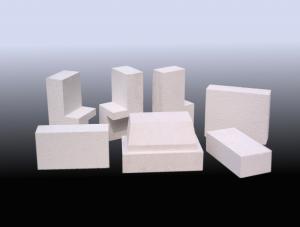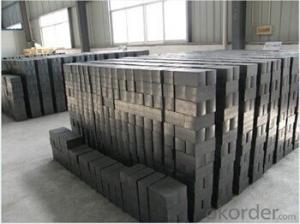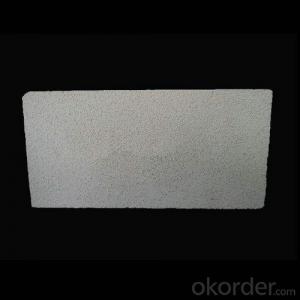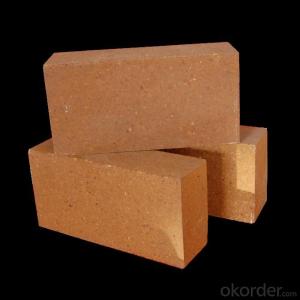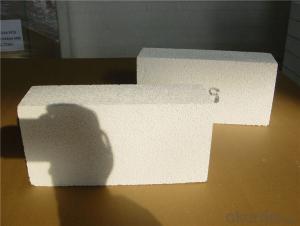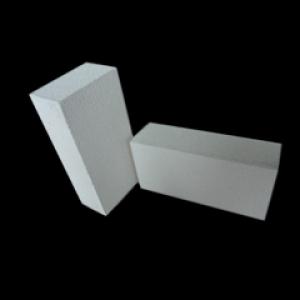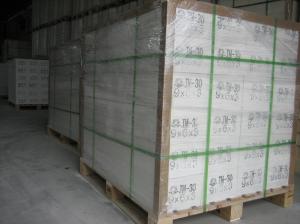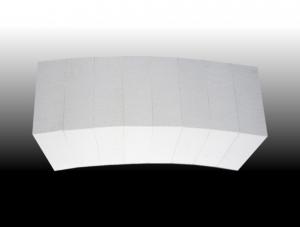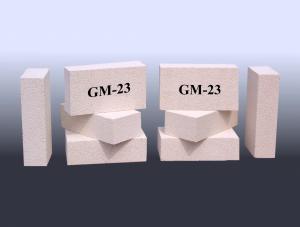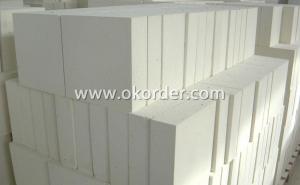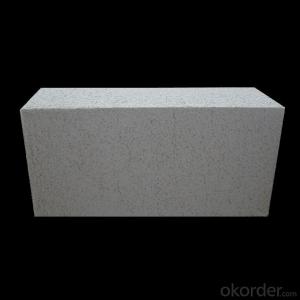Insulating Fire Brick GJM28
- Loading Port:
- China Main Port
- Payment Terms:
- TT OR LC
- Min Order Qty:
- -
- Supply Capability:
- -
OKorder Service Pledge
Quality Product, Order Online Tracking, Timely Delivery
OKorder Financial Service
Credit Rating, Credit Services, Credit Purchasing
You Might Also Like
General Information
CMAX insulating firebricks are classified under temperature between 1300℃ to 1700℃, manufactured from high purity alumina clay.
Feature
Light weight and low thermal conductivity
Low heat storage
Low iron and impurities
High thermal shock resistance
Application
CMAX insulating firebricks can be used as a hot face lining directly exposed to the heat or as a backup insulation layer in iron and steel mills, non-ferrous foundries, petrochemical, ceramic, glass.
- Q:Can insulating fire bricks be used in the construction of thermal oxidizers?
- Yes, insulating fire bricks can be used in the construction of thermal oxidizers. Insulating fire bricks have excellent thermal insulation properties, which make them ideal for applications where high temperatures need to be contained within a specific area. Thermal oxidizers are used to combust volatile organic compounds (VOCs) at high temperatures, and the use of insulating fire bricks can help maintain the required temperature within the combustion chamber while minimizing heat loss to the surroundings. Additionally, insulating fire bricks are lightweight, durable, and have good resistance to thermal shock, which further contributes to their suitability for use in thermal oxidizers.
- Q:Do insulating fire bricks require special handling?
- Yes, insulating fire bricks do require special handling. These bricks are made from lightweight refractory materials and are designed to withstand high temperatures. Due to their fragile nature, they should be handled with care to prevent breakage or damage. It is recommended to use proper lifting and carrying techniques, such as wearing gloves and using tongs or lifters, to avoid accidents or injuries. Additionally, insulating fire bricks should be stored in a dry and protected area to prevent moisture absorption, which can affect their thermal properties.
- Q:What materials are used for roof insulation?
- The other one is inorganic insulation materials, such as Portland, rare earth insulation, the thickness should be 5 cm or more, up to the high cost of auxiliary materials of construction, to reinforce, new inorganic insulation material, the material thickness, on the line of 2-3 cm, direct smear on the top of the house, without auxiliary material, than the price of wool, high aluminum silicate cotton.
- Q:Can insulating fire bricks be used in thermal oxidizers?
- Yes, insulating fire bricks can be used in thermal oxidizers. These bricks are designed to withstand high temperatures and provide excellent insulation, making them suitable for use in thermal oxidizer units. They help to maintain and distribute heat evenly, enhancing the efficiency and performance of the thermal oxidizer system.
- Q:Can insulating fire bricks be used in the construction of autoclaves?
- Insulating fire bricks are indeed applicable for the construction of autoclaves. Autoclaves necessitate materials capable of enduring high temperatures and pressures, and insulating fire bricks are specifically engineered to exhibit exceptional thermal resistance and insulation characteristics. These bricks consist of refractory materials such as alumina, silica, and other additives that enable them to withstand extreme temperatures and thermal shocks. Furthermore, they possess a lightweight composition and low thermal conductivity, thereby reducing heat loss and enhancing energy efficiency within autoclaves. Moreover, insulating fire bricks are endowed with a commendable load-bearing capacity, rendering them suitable for the structural elements of autoclaves. In summary, the utilization of insulating fire bricks during the construction of autoclaves serves to guarantee the safety and effectiveness of the equipment.
- Q:Are insulating fire bricks suitable for use in coke ovens?
- Insulating fire bricks are not suitable for use in coke ovens. Coke ovens require bricks that can withstand extremely high temperatures and harsh chemical environments. Insulating fire bricks are designed to provide thermal insulation and are not able to withstand the heat and chemical exposure that occurs in coke ovens. Therefore, it is crucial to use refractory bricks specifically designed for coke ovens, which have high resistance to temperature, chemical attacks, and thermal shock. These refractory bricks are typically made from materials such as silica, alumina, and carbon, which can withstand the harsh conditions inside the coke ovens.
- Q:Can insulating fire bricks be used in sewage treatment plants?
- Yes, insulating fire bricks can be used in sewage treatment plants. Insulating fire bricks are designed to have excellent thermal insulation properties, which make them suitable for high-temperature applications. In sewage treatment plants, there are often processes that involve the use of heat, such as anaerobic digestion or sludge incineration. Insulating fire bricks can be used to line the walls, floors, and roofs of the incinerators or digesters, helping to retain the heat generated and improve energy efficiency. Additionally, sewage treatment plants often deal with corrosive and abrasive environments due to the presence of chemicals, acids, and solids in the wastewater. Insulating fire bricks are made from high-quality refractory materials that are resistant to chemical attack and erosion. This makes them a suitable choice for lining tanks, pipes, or other equipment that may come into contact with corrosive substances. Furthermore, insulating fire bricks are lightweight, which makes them easier to handle and install compared to other types of refractory materials. This can be beneficial in sewage treatment plants where there might be a need for frequent maintenance or repairs. Overall, insulating fire bricks are a versatile and durable option for use in sewage treatment plants, providing excellent thermal insulation, resistance to corrosive environments, and ease of installation.
- Q:Are insulating fire bricks resistant to oil or chemical spills?
- Insulating fire bricks lack resistance to oil or chemical spills in general. Their main purpose is to endure high temperatures and offer insulation in various settings, such as furnaces, kilns, and fireplaces. Despite their efficient handling of heat and thermal shock, these bricks are typically composed of materials like clay, alumina, or silica, which do not possess inherent resistance to oil or chemicals. In the event of exposure to oil or chemical spills, these bricks may absorb the substances, potentially resulting in degradation or diminished performance over time. Hence, if oil or chemical resistance is a crucial requirement, it is advisable to explore alternative materials explicitly designed for such applications.
- Q:Can insulating fire bricks be used in the construction of hearth furnaces?
- Yes, insulating fire bricks can be used in the construction of hearth furnaces. Insulating fire bricks are specially designed to have low thermal conductivity, which makes them ideal for applications where heat insulation is required. In the construction of hearth furnaces, where high temperatures are involved, insulating fire bricks can help to retain the heat within the furnace and improve energy efficiency. They can also provide thermal protection to the surrounding structures by minimizing heat transfer. Additionally, insulating fire bricks are lightweight and easy to handle, which makes them convenient for construction purposes. Overall, using insulating fire bricks in the construction of hearth furnaces can enhance their performance and contribute to a more efficient and effective heating process.
- Q:Can insulating fire bricks be used in the construction of BBQ pits?
- Indeed, the utilization of insulating fire bricks is feasible for the construction of BBQ pits. These bricks are specifically engineered to endure extreme temperatures and possess exceptional heat resistance attributes, rendering them perfectly suited for BBQ pit applications. By incorporating these bricks, heat is effectively captured and evenly dispersed, leading to improved cooking efficiency and a more enjoyable BBQ experience. Moreover, the inclusion of insulating fire bricks aids in minimizing heat dissipation, guaranteeing that the BBQ pit retains and sustains heat for an extended duration. All in all, the integration of insulating fire bricks significantly enhances the overall performance and longevity of the BBQ pit.
1. Manufacturer Overview |
|
|---|---|
| Location | |
| Year Established | |
| Annual Output Value | |
| Main Markets | |
| Company Certifications | |
2. Manufacturer Certificates |
|
|---|---|
| a) Certification Name | |
| Range | |
| Reference | |
| Validity Period | |
3. Manufacturer Capability |
|
|---|---|
| a)Trade Capacity | |
| Nearest Port | |
| Export Percentage | |
| No.of Employees in Trade Department | |
| Language Spoken: | |
| b)Factory Information | |
| Factory Size: | |
| No. of Production Lines | |
| Contract Manufacturing | |
| Product Price Range | |
Send your message to us
Insulating Fire Brick GJM28
- Loading Port:
- China Main Port
- Payment Terms:
- TT OR LC
- Min Order Qty:
- -
- Supply Capability:
- -
OKorder Service Pledge
Quality Product, Order Online Tracking, Timely Delivery
OKorder Financial Service
Credit Rating, Credit Services, Credit Purchasing
Similar products
New products
Hot products
Related keywords
